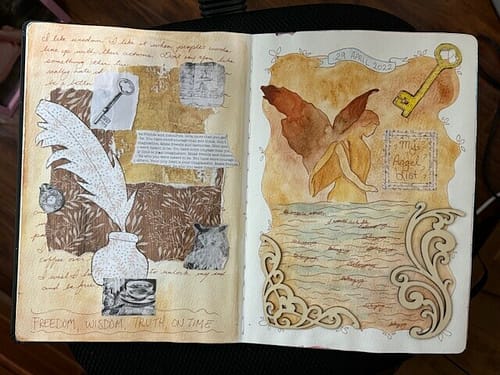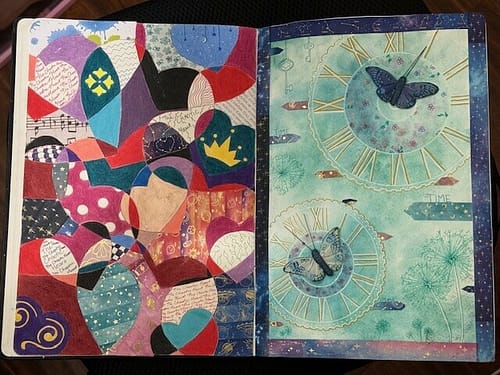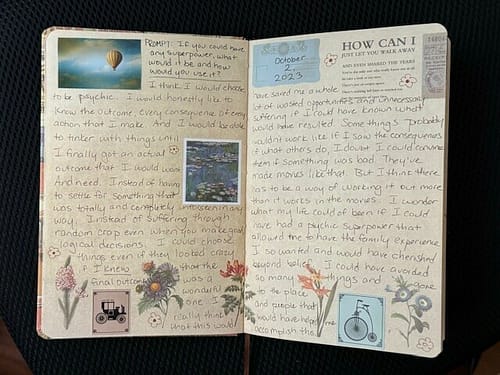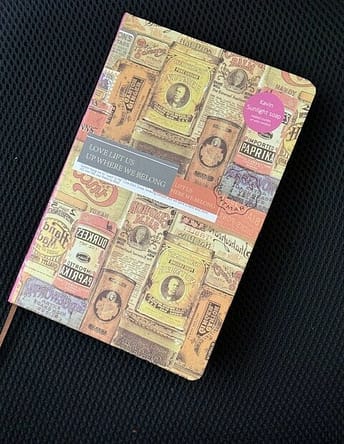Today, I want to talk about a possible powerful ally in what sometimes feels like a less desirable journey: expressive writing. Combining grief and journaling can be a wonderful way to process so many raw feelings. Grief is often such a labyrinth of complex emotions that seems impossible to navigate. It’s not just sadness; it’s a mix of longing, anger, confusion, and sometimes even relief (which can feel a little weird). Every person’s experience is as unique as their fingerprint.
Now, imagine journaling as a compassionate, non-judgmental friend. This isn’t just about putting words on paper; it’s about finding a safe space to let your guard down and explore your deepest feelings. Just like art, writing has a special place in my heart, and it’s one of my favorites when it comes to healing tools. It’s personal, it’s private, and it’s incredibly potent.
The therapeutic power of pen and paper in the midst of loss can be profound. Journaling allows you to have candid conversations with yourself, providing a mirror to understand your wounds a little more and work through those uncomfortable thoughts and feelings that swirl in your mind. There’s no judgment from the paper you confide in; it just patiently absorbs your words, offering you a silent refuge from the chaos.
The Journaling Journey: Cultivating Healing Through Words

As an Amazon Associate, I may earn from qualifying purchases. Links contained in this post are affiliate links for Amazon and I will earn a commission if you make a purchase at no additional cost to you.
When you’re trying to work your way through a stormy ocean of anguish, writing in a journal can be like setting up a lighthouse. For me, I have often found that it sometimes offers direction during those dark, disorienting times when I feel so lost that I really think I may go out of my mind. I like to write in my own journal for at least 10-30 minutes every day because it really feels like it creates a sanctuary for your thoughts and feelings. If you can find just 10 minutes each day or even 2-3 times a week to write out your grief or any thought or emotion within, I think over time you may find that same haven.
Some people think of journaling as a place for just recording events. You can do that, of course, because it would be your journal. But for things that might be weighing on your mind, you might discover a safe space where you can understand your raw emotions a little more, where you work through thoughts and feelings that may seem too complex or painful to articulate aloud. In the privacy of your journal, there’s no judgment from the paper staring back at you. It receives your words without criticism or interruption—just pure acceptance. I know this is super important to me because everytime I have tried to voice certain things having to do with my loss, people tend to become uncomfortable or they feel unwanted or something else negative that I never intended. Most likely, if you’ve experienced loss, you may have come across the same response even from people who mean well. And like me, you may find yourself becoming silent and you start keeping those things to yourself.
But you don’t have to worry about that in a journal. Sometimes, as you spill ink across the page, clarity emerges from the chaos. The support you need that you may not have gotten in your immediate reality just might wind up emerging from the paper. Patterns in your thoughts or behaviors become apparent, offering unexpected solutions or insights into your healing journey. It’s not unusual to start writing with a heavy heart and end with a lighter one, simply because your pen has guided you to find a perspective you hadn’t seen before.
Regularly engaging with your journal can lead to a decrease in stress and anxiety especially where grief is concerned. It’s a humble yet powerful activity, easy to access whenever you need it. You don’t need anything fancy—a notebook and a pen or a computer can be your tools; your truth is the only ingredient. Choose something that resonates with you—maybe it’s the texture of the paper or the color of your notebook—but let it be inviting, a place you’d want to come back to time and again. Here’s some pages from my own journals just to show you a few examples.
This is one of the journals I am currently using. I love collecting journals. And this one is one of my favorites. Some of them are so beautiful to look at. Check out this one below if you are looking for a warm, inviting space to write. It has gorgeous pages with a vintage sort of a feel.
I keep writing journals as well as art journals. I even have an online journal. In case you need a recommendation for an online journal, I use Penzu. It’s free and you can double password protect it. I have been writing in my Penzu journal since 2014, so I have many entries dating back before my late husband died in 2016. I have a whole lot of rawness in this journal and I will most likely never share much of it. I am usually seen as quiet and softspoken and people are often very surprised when I tell them that I sometimes swear a lot in my online journal because I don’t do that out here. But that’s an example of how you can use a journal. You can be or do whatever you want. Yes, sometimes grief (as well as other things) makes me want to swear. The journal has no judgement.
If you decide to journal, as you continue this practice and foster a habit of self-reflection, a journal can become a turning point in your healing process. Not only can it help you navigate your grief with more grace and understanding, but it can also transform your relationship with yourself. By illuminating the strength you hold within, even amidst loss, your journal stands as a testament to your journey and a beacon for your resilience.
Reflective Writing Strategies: Maximizing the Benefits of Journaling
Alright, so we’ve talked about how journaling can be a kind, judgment-free companion in rough times. Now let’s get into how you can really harness the power of writing to work through grief. Choose something that resonates with you, because when it comes to journaling, it’s your game, your rules.
One strategy is to simply start with the phrase, ‘Right now, I feel…’ and let the words flow. Maybe you’ll discover some truths buried deep within you just by allowing your pen to move across the paper. It might surprise you what comes out when there’s no pressure to make it ‘right.’ I really want to stress that because usually in our every day lives, we are confronted with a pressure somewhere on the ‘proper’ way to do anything. Not just grief but anything. It could be at work or at home or at a social or family gathering. We always feel a pressure someplace or somewhere where we want to make sure we do everything right. But writing in a journal, especially if it’s for your eyes only, can be a relief from that pressure.
Another powerful approach is to write letters. You could make a journal theme where you write letters through the entire thing. Sometimes, feeling as if we are talking to someone can help us feel less lonely. Although they’ll never be sent, these letters to loved ones lost or to the people still here or even to your past self can really help you work through those unsaid thoughts and lingering feelings.
And remember, journaling isn’t just about pouring out pain; you can also share your joys and goals and dreams and hopes inside. And over time, it’s also a way to tracking the progress of your healing journey. Every so often, flip back through the pages and acknowledge how far you’ve come. That in itself can be a huge comfort and motivator.
I know that I talk a lot about art on this site, such as painting and drawing. Some people may not want to try that, especially if you don’t typically do much art. But a lot of people can connect with something like expressive writing, which is another form of art, because everyone does some form of writing all the time. Journaling is an easy to access activity that can evolve with you. Keep it flexible and forgiving; some days you might write pages, other days just a sentence. Other days, you might just want to throw the journal across the room (looks guilty). That’s perfectly okay. Just don’t hit anyone.
In my opinion, combining journaling with other forms of support—like counseling, support groups, or art therapy—can create a robust toolkit for managing your grief. Don’t hesitate to explore these avenues as you continue to try to get through the change that loss has inflicted.
So, to wrap up, remember journaling is a simple yet profound way to tenderly hold your grief. It’s an invitation to explore your inner world with kindness, to reduce stress and anxiety, and to possibly stumble upon unexpected solutions or insights. I really hope that you give it a chance. And as I always like to say: it’s not about perfection; it’s about expression and moving forward, in this case, one word at a time!




Nikki, your article resonates deeply with me as I’ve witnessed the transformative power of journaling in the lives of those navigating grief. While I don’t personally have firsthand experience with this topic, I’ve seen friends and loved ones find solace and healing through expressive writing.
Your insights into journaling as a compassionate companion in times of grief mirror the experiences shared with me by others. They’ve described their journals as safe havens where they can freely express their raw emotions without fear of judgment.
Your suggestion of starting with phrases like “Right now, I feel…” and writing letters to loved ones lost or to one’s past self aligns with the strategies I’ve seen others use to navigate their grief journey. These approaches have provided them with outlets for processing their pain and finding moments of clarity amidst the chaos.
I appreciate your emphasis on combining journaling with other forms of support, such as counseling or art therapy. From what I’ve observed, this holistic approach can be incredibly effective in fostering healing and resilience.
Thank you for sharing your insights and offering guidance to those seeking comfort and healing through expressive writing. Your words serve as a beacon of hope for anyone grappling with grief, reminding them that they’re not alone in their journey toward healing.
Dear Jeremy,
Thank you so much for these kind words! I am always happy to hear that something on this site has resonated with someone. I’m glad that people find journaling helpful, especially during trying times and that you understand and have witnessed how such a thing can guide others. I know that journaling is an avenue that I turn to quite frequently and I’m happy to be able to share that peace with others. I appreciate this encouragement and thoughtful comment.
Take care!
Nikki
Hi, Quite by chance I came across your website and it is very opportune for me as it is just what I need right now. I am trying to get over a traumatic event that happened a long time ago but is still affecting me. I write a lot and have started to keep a journal of my feelings. I signed up to Ponzu and will use this going forward. I also believe that art therapy can help me so I will investigate this more. I will revisit your website for more information and suggestions. Thank you very much, you provide a great service, Alan
Hi Alan,
So glad that you are finding some comfort here at my site!! Not only that, that you find some relief from your writing. I noticed that writing is one of the favorites when it comes to using some form of creativity for self expression. I’m sorry that you have had some grief trauma, it’s always hard. But thank you for visiting here and that you find it helpful enough for you to return. That means a lot!
Hey Nikki,
I really like your article about Grief and Journaling it brought me to a next level. I have been dealing with this topic for a very long time and want to leave my expertise.
Expressive writing, often used as a therapeutic tool, involves putting thoughts and feelings into words without concern for grammar or structure. Many studies have shown its effectiveness in promoting emotional healing and well-being. Through this process, individuals can explore and make sense of their experiences, helping to alleviate stress and trauma.
It provides a safe outlet for expressing deep-seated emotions, leading to catharsis and a sense of relief. By externalizing inner struggles onto paper, individuals gain new perspectives and insights into their own emotions and behaviors.
Expressive writing can also enhance self-awareness and mindfulness, fostering personal growth and resilience. It has been particularly beneficial for those dealing with grief, anxiety, depression, and PTSD.
Regular practice of expressive writing has been linked to improved mood, better coping skills, and enhanced immune function.
Overall, it serves as a powerful tool for individuals to process their emotions, find meaning in their experiences, and facilitate healing on a profound level.
Thank you for your article, in my opinion it is very powerfull and helpfull!
Hi Matthias,
Thank you for all of these thoughts on how journaling can help us deal with not only grief but also personal growth and insight! Writing is one of my favorite forms of art for both of these things. It can provide so much for us, especially as we try to get through something as sharp as loss since it’s usually a safe space with no judgments.
Thanks again and take care!
Nikki